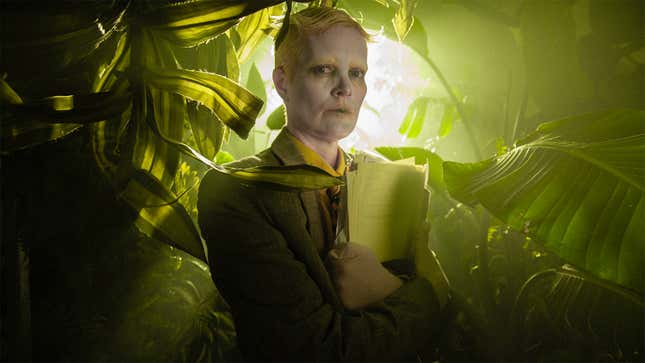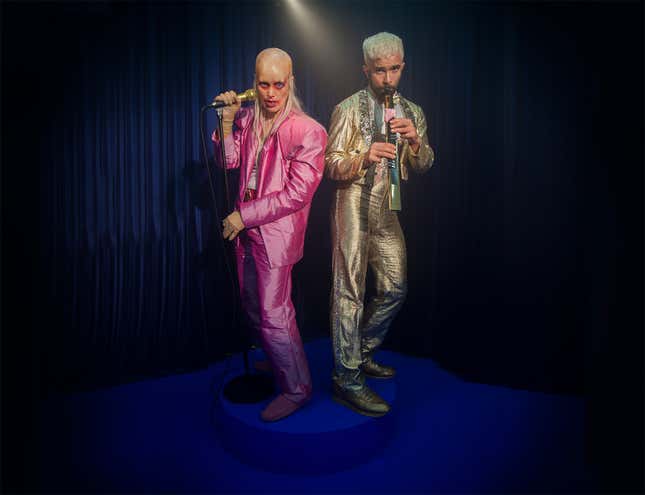Fever Ray Found Humor in Darkness for Their Creepy Love Album ‘Radical Romantics’
In an interview, the artist discusses evolution, experimenting with gender presentation, and a desire for play.
EntertainmentMusic

Fever Ray’s work rarely yields anything that could be described as “conventional,” at least from a pop-music perspective. And yet, in a conversation Jezebel this week, the artist revealed rather common underpinnings to their work: a desire for play and a quest for freedom. The most recent play session is the third Fever Ray album, Radical Romantics (out Friday), which is home to 10 “itchy,” electronic left-of-pop songs that gurgle with odd voices and boom with bass.
Sweden’s Karin Dreijer (the person behind Fever Ray) said they like to combine darkness with humor, though the former is much more obvious than the latter on Radical Romantics. In any case, the industrial-clank-meets-DJ Mustard of “Looking for a Ghost” includes what I think of as a funny way to illustrate the particularities of eligible singles on the hunt: “Looking for person/with a special kind of smile/teeth like razors/fingers like spice/looking for a ghost/in the midst of life/asking for a friend/who’s kind of shy.” According to its official bio, Radical Romantics is a “love album,” though that’s kind of like calling the poison ethylene glycol a sweet. It’s technically true, but not exactly straightforwardly so and in any event it packs a mean punch.
The album finds Dreijer collaborating with their brother Olof Dreijer—together, the two comprised the beloved duo the Knife, though the four songs they worked together on for Romantics don’t exactly qualify as a Knife regrouping. For one thing, Karin calls the shots in Fever Ray and has the final cut, as it were (as opposed to the much more democratic creative process in the Knife). Dreijer also said this creative reunion is not meant to indicate plans for further Knife work—Olof will release his own music later this year. Trent Reznor and Atticus Ross lend their hands to “Even It Out,” a lyrical threat to one of Dreijer’s children’s bullies that’s reminiscent of the scene in Tár when Lydia marches up to the child who’s been tormenting her daughter and lets her have it. The song, like many of Dreijer’s, is based on a true story—this one involved sexism and transphobia, according to a recent interview with Pitchfork.
I don’t know what I was expecting from Dreijer—maybe someone less patient or potentially combative, given their mirthful, sometimes furious on-record persona—but what I got in our Zoom was an extremely chill, thoughtful creator in a gray hoodie. They called in from their place in Stockholm, having just spent hours rehearsing for the upcoming Fever Ray tour, which will feature all new arrangements of some songs, as their last tour did. Dreijer was patient and unpretentious when explaining the inspiration for their songs (the promo of Radical Romantics was issued with a track-by-track rundown of themes), even if said meanings are ultimately oblique (an example from that rundown: “‘New Utensils’ is some sort of list making of everything you feel you need for a flight or is it a picnic date, or is it a move out to the country, or is it getting ready for an evacuation, or is it reading a how to survive instruction manual?”).
JEZEBEL: How conscious is the “radical” aspect to what you do? Do you think of music as an opportunity to create new sounds? Are you out to innovate sonically?
KARIN DREIJER: No. I like to find settings and music and musical spaces that are a little bit itchy or humorous in a way. I really like to find sounds and melodies that make you smile a little bit with maybe darker or sadder environments. To mix that with those more humorous elements, that is what I find fun to work with—to try to create those worlds or atmospheres where you can feel that there are these different elements within.
Do you have a set process for writing songs and coming up with sounds?
I can drive my car and think of a melody, and then I try to record it. So that’s one way. And sometimes I just sit and play guitar. On this album I’ve played quite a lot of guitar. When I was in my twenties, I listened a lot to like, Sonic Youth, and back then it was magical, how they tuned their guitars and stuff. You didn’t really understand how they could make all these sounds, but now one of my kids showed me a website where you could see all the Sonic Youth tunings for every track. We have been tuning guitars in different ways and playing and then you come up with totally new ways of making sounds. So, it can be sounds and it can be just ideas. Sometimes it’s lyrics that come first. But I think it’s mostly music first.
-

-

-

-

-

-

-

-

-

-

-

-

-

-

-

-

-

-

-

-

-

-

-

-

-

-

-

-

-

-

-

-

-

-

-

-

-

-

-

-









































